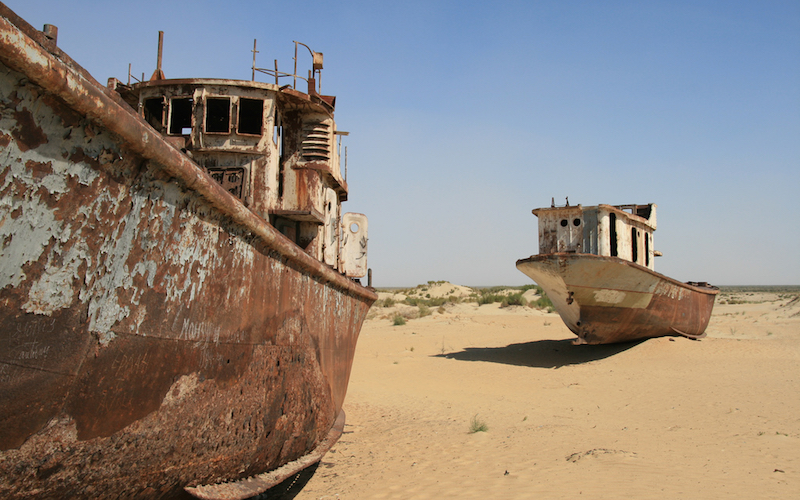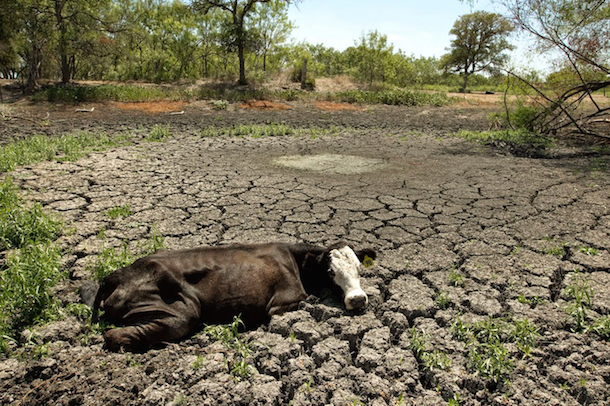
The Growing Potential for Water Wars
Tensions over water are nothing new and will increase as shortages mount. However, it is possible to avoid violent conflicts over this fundamental resource for human survival provided certain efforts are made to address this pressing challenge.
According to its Charter, the United Nations’ purposes are to maintain international peace and security; to develop friendly relations among nations; and to cooperate in solving international economic, social, cultural and humanitarian problems. It also seeks to promote respect for human rights and fundamental freedoms and to be a centre for harmonizing the actions of nations in attaining these ends. These worthy aims were reaffirmed and clarified in the 2000 United Nations Millennium Development Goals (MDGs) which are expected to be achieved by the year 2015.
However, the international community has been faced with old threats and new challenges since the onset of the 21st century. It is understandable that world leaders have recognized poverty as the greatest problem facing the world in the new century, as its prevalence threatens the fundamental values of freedom, equality, solidarity, tolerance, respect for nature and shared responsibilities. However, each of these fundamental values is also interlinked with the environment and the presence, or absence, of natural resources. As a consequence, so-called ‘soft threats’ have been added to the list of threats to international security: environmental degradation, resource depletion, contagious diseases and corruption, to name a few.
There is now a consensus that the degradation of environmental conditions and both a scarcity and abundance of natural resources could become causes of conflict, and that these issues must be addressed in a more systematic fashion. But most importantly, ensuring access to sufficient quantities of drinkable water and sanitation services is a prerequisite to achieving the other shared goals outlined in the United Nations Millennium Development Goals.
Nowhere is this more of a prerequisite than in the Middle East. Considered a “strategic” resource, water resources are now a source of tensions between regional states and could be the cause of armed conflicts in the not so distant future.
Water has become a heated political issue in that region and there have been a collection of peace or cooperation agreements proposed or ratified in recent years which are directly or indirectly related to water sharing.
All this led former Secretary-General of the United Nations Boutros Boutros Ghali (1990s) and the late King Hussein of Jordan to foresee that the next interstate war in the Middle East could be sparked by water issues. This idea has also gripped the public imagination and caused great consternation in the intelligence communities of various countries, which fear that water and other scarce resources will ignite wars of global proportions in the future.
Scarce Resources
In many cases, comments attributed to individuals are either exaggerated by the press or made for purely political purposes. Nevertheless, water has clearly become a scarce resource in a growing number of regions. The use, ownership of and access to water give rise to tensions which will only be exacerbated as time goes on. The Middle East and Africa are the regions of greatest concern in this respect: it is estimated that 40 countries in these regions will suffer from water insecurity or scarcity by 2025.
The term ‘water scarcity’ refers to the availability of water under the economic ‘law’ of supply and demand, i.e. the central economic problem in all societies of having seemingly unlimited human wants in a world of limited resources. Some regions, due to population growth and rising per capita consumption, are experiencing alarming increases in demand for water in food production, energy and industry while supply is stagnating or dropping off. In many countries with ever-dwindling amounts of water, such as Jordan and Israel, solutions are not obvious, and increasing the supply of water comes at a huge cost and is an almost daily preoccupation.
It is already foreseeable that tensions over water will increase at a faster rate over time than they did in the first decade of the 21st century. In countries like Egypt and Uzbekistan the latest advances in water conservation, the abandonment of crops requiring intensive watering, or water supply from neighboring states may be reasonable, yet difficult, solutions to implement.
The second critical point is the deterioration of water quality. Agriculture is the biggest-polluting daily activity: the increasingly intensive use of chemical inputs (herbicides, fertilizers, pesticides and additive food) to obtained increased yields has contaminated both surface and underground water sources. Household and industrial pollution are also on the rise and progressively affect both industrialized and developing countries.
Finally, water consumption is rapidly gaining a geopolitical dimension. Water passes from upstream to downstream users, so that usage in one place affects the quantity and quality of the water available in another. For example, Egypt and Sudan were for many years in dispute over the construction of the Merowe Dam in Sudan before it was finally inaugurated on March 3, 2009. Egypt maintained that the dam would affect the Nile river basin downstream. Similar disputes and concerns are found in Southeast Asian countries resulting from the Chinese government’s intensive transformation of shared waterways, including scores of gigantic hydropower dams.

Water use has historical, cultural, economic and social aspects. In some societies, among villagers in particular, water, they claim, is ‘God-given’ and as a result they believe it should not be priced. On the other hand, an international body like the World Bank has supported the full marginal pricing of water.
Another problem is the inadequacy of the regulatory framework for resolving trans-boundary water-related disputes. There are four doctrines concerning sovereignty over international rivers, all of which are somewhat unsound: absolute territorial sovereignty, under which riparian states may use water resources as they wish, even if this is prejudicial to the interests of other states; absolute territorial integrity, i.e., the use of a river should not have a negative affect downstream riparian states; limited territorial sovereignty, which combines elements of the two previous doctrines in an attempt to ensure that all parties use water resources equitably; and the community of co-riparian states sharing the waters of an international river, an approach which endorses integrated river basin management practices.
Global Implications
Water shortages and pollution affect human health and quality of life. They may also have a substantial impact on ecosystems and hinder normal economic and agricultural development. Local and regional water problems are far reaching, affecting the rest of the world by threatening the quality and integrity of domestic food supplies. The latter problem knows no borders and is in itself a direct threat to human security and the global economy. The United Nations Commission on Sustainable Development, established in1992, has warned that current local water issues have the potential to cause a range of local and regional crises, with global and potentially irreversible consequences.
Are violent conflicts over water probable in the future? Historical experience suggests that the likelihood is low. However, many contemporary specialists contend that in the mid and long term such conflicts will increasingly emerge in many places and make the world as a whole more inflammable. These projections are based on the assumption that the growing demand for water, the decline of freshwater availability, and the harmful health effects of ingesting poor quality water will stir up violence and lead to water wars. However, warring over water availability or rights is not rational, economically or politically.
Assuredly, in the decades ahead water scarcity will intensify to the point of becoming the main issue in some regions of the world. Global warming is expected to modify rain and snow patterns and evapotranspiration regimes in many areas, and long-term water supply planners must bear that in mind. Nor is there doubt that the cost of water will go up as it becomes scarcer. Therefore, progress in water efficiency and an overhaul of the economic system away from water-intensive sectors are increasingly necessary.
The most important improvements in water use patterns can be achieved in agriculture, given that water for irrigation accounts for 70% of global water consumption. As water prices increase new distribution systems, such as long-distance pipeline and water transport tankers, could come into operation. The construction of desalination plants may also contribute to water resource conservation, although to date this technology has been prohibitively expensive and thus mainly confined to states with surplus energy supplies. The importation of water, as in Singapore, may thus become the only viable solution.
Two other factors could inflame tensions over water. First, water shortages could boost food imports. In 2015 nearly half the world’s population relies on the global market to secure its food supply. How states with a high national debt and poorly endowed with water can generate enough revenues to finance these food imports will become a crucial issue. Second, competition for water will mount: between urban and rural communities, between agricultural and household consumption and between countries. Fast urbanization, which is taking place in the great majority of developing countries, will exacerbate this competition. However, the resolution of many future water supply problems will be possible through cooperation agreements and investment in infrastructure facilities. The latter, and preventive diplomacy concerning shared water resources, are the issues that will come to predominate bilateral and multilateral state relations.
While historically shortfalls in water supplies, per se, have rarely and directly caused violent conflicts, in many cases gaining control of water resources and waterways has been a strategic objective of military organizations. However, water security has often been the origin of many intra-state disputes and military conflicts. It is possible that the potential for violent conflict over water issues is inversely proportional to the size (and nature) of the political entities involved.
Yet water use and efficiency will remain high on the global agenda for quite some time. Water may even become the determining factor in the future conflicts on the national and regional levels.

